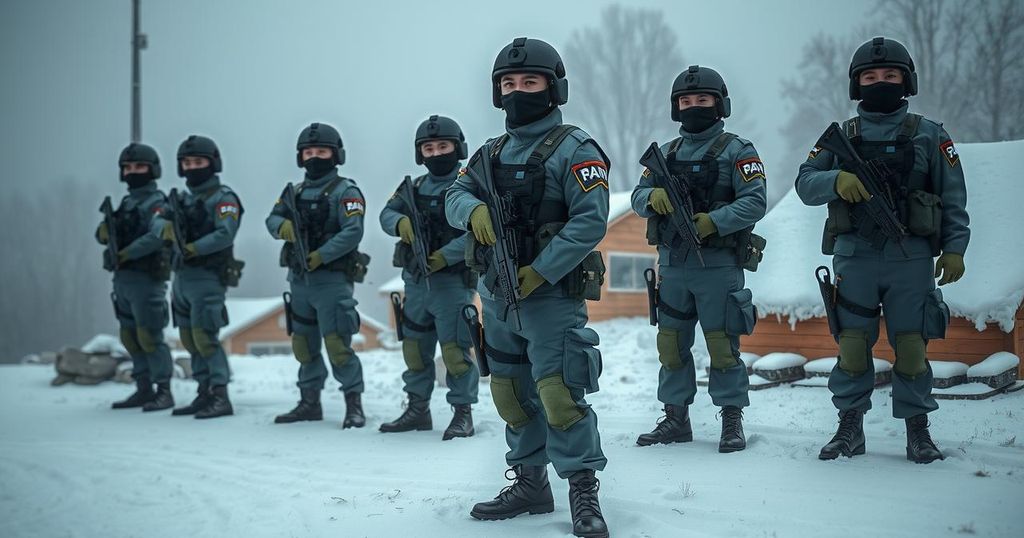North Korean Troops Allegedly Using Fake IDs in Ukraine Conflict

Ukraine claims that North Korean troops are using fake Russian IDs to disguise their presence in the conflict, with an estimated 1,100 casualties reported. Switzerland has imposed new sanctions against Russia and Belarus. Talks regarding the complexities of Russian gas exports to Europe are ongoing, while a Ukrainian investigation names a Russian general in a missile strike on a hotel. North Korea appears poised to send additional military support to Russia, reflecting the continuing international ramifications of the war.
Recent statements from Ukrainian officials indicate that North Korean troops in Russia are allegedly using counterfeit Russian identification documents to obscure their identity and participation in the conflict against Ukraine. Special forces in Kyiv reported recovering the fake IDs from deceased soldiers in the Kursk region, noting that the signatures were in Korean, revealing their true allegiance. South Korean military assessments estimate approximately 1,100 casualties among these North Korean forces who have engaged in combat, highlighting a significant loss of life.
In an effort to impose economic pressure, Switzerland has adopted a fresh set of European Union sanctions against Russia and Belarus. This includes freezing assets of 54 individuals and 30 entities linked to Russian military operations and banning certain vessels associated with circumventing oil price caps or facilitating military supplies. Moreover, the sanctions also extend to Belarusian entities, reflecting a coordinated international strategy to counteract Russian aggression.
Amid these developments, discussions between Russian President Vladimir Putin and Slovak Prime Minister Robert Fico focused on the complicated status of Russian gas exports to Europe, especially as existing transit agreements face expiration. Ukraine indicated it would not renew its gas transit contract without preconditions, thereby intensifying the energy dilemma.
Furthermore, the Security Service of Ukraine has identified Colonel General Alexei Kim as a suspect in a missile strike targeting a hotel that resulted in the death of a Reuters journalist. The Ukrainian government’s investigation suggests a deliberate act against civilians. Meanwhile, a Russian delegation is set to visit Iran to finalize a comprehensive cooperation agreement, strengthening ties between the two nations amidst ongoing tensions with the West.
In parallel, South Korean intelligence indicates that North Korea is preparing to dispatch additional forces and drones, indicating the continuation of military support to Russia. Although Pope Francis has called for a worldwide ceasefire ahead of the Christmas season, the conflict in Ukraine endures, with Ukraine reporting the interception of numerous Russian-launched drones by its air force.
The ongoing war between Ukraine and Russia has seen various international implications, particularly involving neighboring nations and global powers. In recent months, the involvement of North Korean troops fighting alongside Russian forces has raised alarm bells in the international community. Observations from military analysts reveal that Russia seeks to mask its reliance on foreign fighters, as evidenced by the use of counterfeit identification among North Korean soldiers. Additionally, the sanctions imposed on Russia by Switzerland signal a broader effort to economically constrain the nation amid its military endeavors. As the situation unfolds, diplomatic discussions and military alignments continue to shape the dynamic landscape of the region, particularly with regards to energy supply challenges and international responses to warfare.
As tensions persist in the ongoing Ukraine-Russia conflict, recent revelations regarding North Korean troops participating on Russian soil underline the complexities of the situation. The evidence of fraudulent identification documents highlights Russia’s attempts to obscure foreign involvement. South Korean intelligence reports on military casualties, paired with the establishment of stringent sanctions by Switzerland, demonstrate a strong international response to Russia’s actions. Furthermore, the latest developments in energy diplomacy and military cooperation with Iran illustrate the evolving geopolitical landscape surrounding this prolonged conflict. The call for a global ceasefire by Pope Francis serves as a reminder of the urgent need for peace in these turbulent times.
Original Source: www.independent.co.uk








